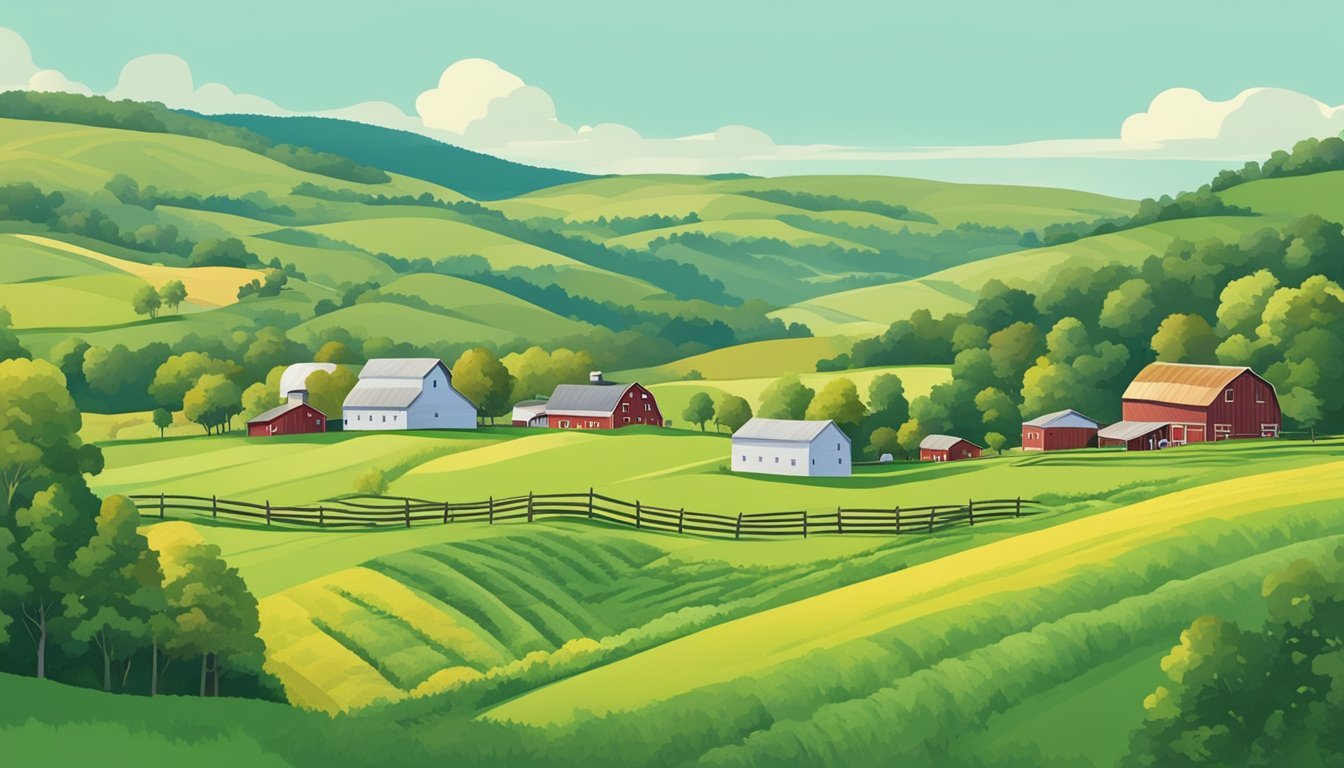Small Farms for Sale in West Virginia
A Buyer’s Guide to Rural Opportunities
This Article is Part of State-by-State Guide to Buying Your First Small Farm
Small farms in West Virginia offer a unique opportunity for prospective buyers looking to engage in agriculture on a more manageable scale or simply seeking a rural lifestyle. Known for its rolling hills, rich soil, and diverse climate, West Virginia provides an ideal setting for small-scale agriculture. These properties typically range in size, providing options for those interested in hobby farming, sustainable living, or expanding their agricultural business.
The real estate market in West Virginia for small farms is varied, with properties often featuring ample land for cultivation and pasturing, as well as existing amenities such as barns, fencing, and sometimes residential homes. Buyers can find farms with different features that might include water access, wooded areas, and open fields, appealing to a wide range of agricultural interests from livestock to crop farming.
Current listings of small farms for sale in West Virginia reveal a spectrum of options at different price points, catering to a range of budgets and needs. Whether the search is for a fully operational farm or a property that serves as a blank canvas for agricultural dreams, the state's offerings are as diverse as its landscape. Each farm's locale in the various regions of West Virginia further defines its potential, with local climate and soil conditions influencing the type of farming that can be most successfully pursued.
Why Choose West Virginia for Small Farms
West Virginia offers unique opportunities for small farms, including rural mini farms and country farmettes, through its diverse geographical landscape and supportive economic climate.
Geographical Advantages
West Virginia, known for its rolling hills and lush landscapes, provides an ideal environment for small-scale agriculture. The state's varied topography and climate are conducive to a wide range of agricultural pursuits:
Soil Quality: Rich, fertile soils are prevalent, especially in regions like Greenbrier and Pocahontas Counties, offering a solid foundation for crops and pastures.
Climate: The state experiences four distinct seasons, allowing for a variety of crops to be grown throughout the year.
Water Resources: Abundant water sources from rivers and streams facilitate irrigation and livestock needs.
Economic Incentives
The economic environment in West Virginia supports small farm owners with several incentives:
Land Prices: Compared to other states, West Virginia's land is reasonably priced, with properties across counties such as Pendleton and Harrison offering affordability.
Local Markets: There is a growing interest in local, farm-to-table produce, opening up markets for small farm owners to sell their products directly to consumers and restaurants.
Agricultural Programs: West Virginia University's Extension Service provides tailored advice and support, ensuring that small farm operators can maximize their farm's efficiency and output.
Understanding the Market
The West Virginia real estate market for small farms shows an active environment, where listing prices are affected by diverse factors, including acreage and local economic conditions.
Current Trends in Real Estate
In West Virginia, there is a range of properties appealing to potential buyers looking for small farms. The inventory fluctuates with seasonal trends, with more properties often listed in the spring and fewer during the winter months. The primarily rural geography leads to wide variability in listings, featuring farms from 10 to nearly 50 acres. Recently, there’s been an inclination toward sustainable and hobby farming which has influenced the nature of demand for smaller acreages.
Inventory Movement: Listing counts can indicate market health, with higher counts suggesting a bustling market.
Demand for Small Farms: A shift toward smaller, manageable properties has been observed, catering to those looking for lifestyle farms or sustainable living.
Factors Influencing Listing Price
Listing prices for small farms in West Virginia are predicated on several dynamic variables. The price per acre is particularly relevant as it serves as a gauge for comparing the value across different properties. Typically, factors like land quality, location, infrastructure, and existing dwellings play substantial roles in determining the listing price.
Price per Acre: This figure helps potential buyers assess the value of the land and make comparisons.
Location: Proximity to amenities and accessibility could elevate a property's desirability and hence its price.
Infrastructure: Existing structures, such as homes and barns, can considerably add to a property’s appeal and asking price.
Land Quality: Fertility of the soil, water sources, and topography can impact listing prices, as they affect the farm’s utility and potential productivity.
Local Economic Conditions: Economic vitality within a region can drive up demand, tightening the market and pushing prices higher.
Types of Small Farms For Sale
West Virginia offers a diverse range of small farms for sale, catering to enthusiasts seeking hobby farms, those preferring rural mini farms, and individuals looking for acreage suitable for livestock.
Hobby Farms and Their Appeal
Hobby farms in West Virginia present an attractive option for those pursuing a self-sufficient lifestyle or recreational farming activities. Buyers often find properties with 2 to 4 acres of land, ideal for small-scale vegetable gardens, orchards, and poultry. Greenbrier County and Pocahontas County, in particular, list properties that provide a balance of open fields and wooded areas, suitable for a hobby farm setting.
Rural Mini Farms
Rural mini farms are typically larger than hobby farms and offer additional land for increased agricultural activities. These farms often have 3 to 7 acres of land, enabling owners to cultivate a wider variety of crops and raise more livestock. Buyers interested in mini farms can find properties in places like Frankford, WV 24938, providing ample space for goats, sheep, and other farm animals.
Acreage Suitable for Livestock
When considering raising livestock such as goats and sheep, West Virginia small farms with greater acreage are a practical choice. Farms ranging from 7 to 20 acres are frequently listed, offering significant space for grazing and shelters. The terrains of these farms are suitable for livestock, ensuring that animals like goats and sheep have the environment they need to thrive. Areas like Buckeye, WV 24924, often feature such farms, complete with fencing and water sources conducive to raising healthy livestock.
Buying Process
The buying process for small farms in West Virginia involves understanding the property size and usability, negotiating a fair purchase price, and completing the necessary steps to finalize the sale.
Assessing Property Size and Usability
Prospective buyers should evaluate the property size and determine if it meets their farming needs. They must consider factors such as the quality of soil, water availability, and overall land condition. It's imperative that the size of the land aligns with the type of farming they plan to conduct, whether it's for cultivation or livestock rearing.
Property Size: Check acreage against farming plans.
Land Usability: Examine soil quality, water sources, and terrain.
Negotiating Purchase Price
Negotiating the purchase price starts with a thorough analysis of the market to understand the value of the land for sale. Buyers can consult listings and recent sales to inform their offers. An effective negotiation leads to a price that reflects both the market standards and the specific features of the property.
Market Analysis: Research recent sales for comparable properties.
Offer Strategy: Base initial offer on property assessment and market data.
Finalizing the Sale
Finalizing the sale involves a series of legal steps to transfer ownership. This typically includes signing a purchase agreement, conducting a property inspection, and obtaining title insurance. It’s crucial for buyers to review all documents closely and secure financing before concluding the process.
Legal Steps: Sign the purchase agreement and perform due diligence.
Closing: Complete payment, obtain title insurance, and record the deed.
Post-Purchase Considerations
Acquiring a small farm in West Virginia involves more than just the purchase; buyers must be prepared to manage their new land effectively and adhere to local regulations.
Land Management and Upkeep
Once the ownership of a small farm, typically ranging from 5 to several hundred acres, is secured, the buyer must focus on land management. Regular upkeep is crucial to maintain the health of the soil and the productivity of the land. Tasks include:
Soil testing and amendments
Crop rotation and land resting
Pest and weed control
Equipment maintenance
Buyers should develop a management plan that outlines the specific needs of their farm, considering its size and the type of agriculture they intend to pursue.
Zoning and Compliance
Buyers must familiarize themselves with local zoning laws to ensure their farm activities are compliant. Key areas include:
Land use restrictions
Building permits
Environmental regulations
Small farm owners should contact their local county office to understand the necessary compliance measures. It is essential to be aware of any changes in zoning laws that could affect farm operations.
Overall, a buyer must be diligent in their responsibilities to ensure their farm remains productive and compliant with all regulations.
Additional Resources
When searching for small farms for sale in West Virginia, several online platforms can be invaluable resources. The following list contains curated websites that they can browse to find properties that match their criteria, including the desired acreage for sale.
LandSearch: This site lists small farms available in West Virginia and allows users to explore land by county, size, and price. For instance, at the time of writing, Pendleton County featured a 49-acre property. Potential buyers should check regularly for the latest listings.
LandWatch: Offers regional sorting to refine searches, like Northeast and Southeast Regions. Buyers can look for farms and ranches by selecting the specific county of interest, such as Greenbrier or Monroe County.
Platform Feature Land And Farm They offer extensive listings including price ranges and land size, with various properties ranging from under $50,000 to over $750,000. LandSearch Users can find a comprehensive set of properties, including detailed descriptions and pricing per acre.
Prospective buyers may also consider:
Local Real Estate Agents: Agents with experience in rural properties can provide tailored options and insider knowledge on the local market.
Agricultural Extension Offices: State and county extension offices can provide information on farming resources, zoning, and land use regulations, which are crucial when purchasing farm land.
Each resource offers a unique set of tools to help buyers make informed decisions. Remember, researching thoroughly before purchasing is key to finding a farm that fits one's needs and budget.






